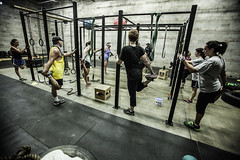
There are times when, during a discussion about wellness, I can pinpoint the moment someone isn’t going to follow my advice. There’s a subtle shift in their posture – slight deviation in their gaze – and I know that I’ve hit upon a bit of advice that they aren’t going to follow.
Think of the experts in your life. Do you have a financial advisor? What about a mechanic, doctor, or pest exterminator? Do you trust them? Do you put that trust into action by following their instructions?
The number one most ignored instruction I give is, “track your nutrition.” Nothing else comes close. In our article on tracking I told you that even I struggled with learning that new habit. Yet, when I finally took the advice of my trainer and began tracking my food intake, I saw the results I’d been seeking.
Let’s look at why people don’t heed good advice and what we can do to get past that decision. We must first note that for as long as we continue doing what we’ve always done, we will continue seeing the same results.
I find that the resistance to my instruction comes early. People are usually eager to see results, but they want to see results doing things based on poor advice and faulty reasoning. “I don’t need to track my food because I know what I eat,” is logic that is flawed and challenging to overcome. Yet, so many questions are answered by taking that step. That said, we must ask why we aren’t following instructions from an expert.
Remember when we said that there’s no guess work in fitness? It’s scientific. Cause and effect are present throughout your wellness journey. Decision making, on the other hand, involves logic as well as emotion. The decision to start something new, especially if it can change your life, is an emotional one. While you have every logical reason to make improvements, many of us need an emotional response to a pain point to make a real commitment.
Think of everything you might discover by tracking your nutritional intake. You may feel bad about your choices. The discovery could lead to resentment and emotional discomfort. The results might even be embarrassing. Even if logic proves you must control your eating, we cannot dismiss the emotional response to an honest evaluation of ourselves. If we know the truth about our situation, we will have to act.
When the mechanic tells us our air filter looks rough, we say that we’re just here for an oil change. When the doctor says we need to modify our diet, we medicate instead. You see, we haven’t felt the pain of that air filter being clogged. We don’t feel like we need to change our nutrition. So, we don’t take advice because the action is hard. It’s unknown, we may suspect it’s not needed. So, we hope that by doing nothing, things will improve anyway. Logically, we know that won’t be the case. Emotionally, we feel unprepared for change.
It’s good to be nervous about change. It means you’re taking it seriously. A little anxiety indicates that you predict that your actions will have results. It’s true that you may miss the mark. But, and this is what really matters, something wonderful might happen too. It’s getting motivated by the chance for the best possible outcome that should drive our decisions. So, how do we get started?
The answer is both simple and infuriating. You just start. How do you start? You start. Yeah, but how do I get started? You get started, that’s how. If I have a client who just can’t commit to tracking their meals, I compromise. I ask them to track just their protein for two weeks. There are plenty of apps that will make that task easier for them. Once they’ve tracked their protein, they discover that tracking nutrition isn’t all that tough. They started by starting.
Any time you are given advice, there are competing voices giving you counter-intelligence. The internet, your friend, your co-worker who lost 50 lbs for her wedding, all have a different “fact” to share about wellness. But would you trust them to write your prescriptions, repair your car, or work on your home’s foundation? I hope if the answer is yes, it’s because you know a mechanic, doctor, and contractor. Otherwise, stick with the experts. As a fitness professional, I only want what’s best for my clients. If they’re unhealthy, I’m on the hook to partner with them in making change. That partnership works both ways though. You have to weed through the competing voices and listen to the wise council you sought in the first place. If the answer you’re given is tough, it’s because it’s time to leave your comfort zone. Be wary of any advice that sounds too easy. Your comfort zone will box you in. The door opens when you start heeding the advice you’re given by the folks most qualified to give it. If you’re having trouble taking the necessary leap, include that feeling in your conversation. Fitness is based on science, but that doesn’t mean we have any interest in removing your emotional commitment from the equation. If anything, I want the opposite. I want to hear about your fear so that we can turn that into your Heart. I want to hear about your obstacles so that we can reset your Focus. It’s time to share your hesitation so that we find your Power. That’s my advice. I hope you’ll take it.




